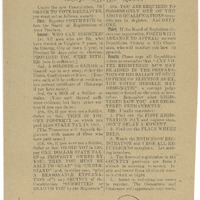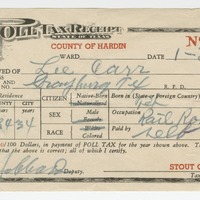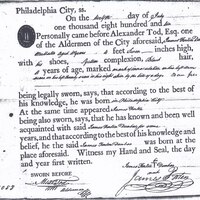 Negroes and Mulattoes (1851) Negroes and Mulattoes (1851) |
|
Part of the Black Codes passed by Northwest Ordinance states prior to Reconstruction, this article in the Indiana Constitution is an example of the way "free" states ensured white supremacy.
|
 New Jersey Disfranchisement Statute (1807) New Jersey Disfranchisement Statute (1807) |
|
This New Jersey statute explicitly banned women and free people from color from voting, after these groups had been enfranchised since 1776. When New Jersey rewrote its constitution in 1844, it explicitly denied women and African Americans the right to vote.
|
 Notice to Republican Voters of the 9th Congressional District of Virginia (1902) Notice to Republican Voters of the 9th Congressional District of Virginia (1902) |
|
This broadside publicized information about new voting laws and poll taxes in Virginia.
|
 Of Colored Persons (1871) Of Colored Persons (1871) |
|
This act passed by the Virginia General Assembly reflects the race-neutral language of the legal code after the Civil War. Application of these statutes resulted in entrenched Jim Crow segregation.
|
 Of Masters and Apprentices (1887) Of Masters and Apprentices (1887) |
|
Acts passed by the Virginia General Assembly reflected race-neutral language of the legal code after the Civil War. Application of these statutes resulted in entrenched Jim Crow segregation.
|
 Oklahoma's Poor Rich Indians: An Orgy of Graft and Exploitation of the Five Civilized Tribes, Legalized Robbery (1924) Oklahoma's Poor Rich Indians: An Orgy of Graft and Exploitation of the Five Civilized Tribes, Legalized Robbery (1924) |
|
The introduction of Zitkala-Ša's groundbreaking report opened the scene on fraud facilitated by guardians, lawmakers, and county clerks at the expense of minors, heirs, and incompetents during early Oklahoma statehood, and focused on probate courts as a site of legal exploitation.
|
 Opinion of Judge Hays on Slavery in California (1856) Opinion of Judge Hays on Slavery in California (1856) |
|
In the decision in this case, a California judge ruled that Biddy Mason and her three children, as well as a woman named Hannah and her nine children and grandchildren, were "free forever" after their enslaver brought them into the free state of California to reside. The judge's opinion was published in the official newspaper of the American Anti-Slavery Society.
|
 Page Act (1875) Page Act (1875) |
|
The Page Act was a federal law that profiled Chinese and other women immigrating from Asian countries as immoral, barring them from entering the United States.
|
 Paul Jones v. George W. Jones (1840) Paul Jones v. George W. Jones (1840) |
|
Paul Jones initiated a suit in a Wisconsin Territory court against George W. Jones for several sums of money owed to him for labor, goods, wares, and merchandise. George argued that Paul was purchased as a slave for life from French inhabitants who were entitled to hold slaves according to the Northwest Ordinance of 1787.
|
 Pensionado Act (1903) Pensionado Act (1903) |
|
This act, passed in the aftermath of the Philippine–American War, established a scholarship program for Filipino people to receive an education in the U.S.
|
 Peonage Act of 1867 Peonage Act of 1867 |
|
Following the passage of the 13th Amendment, this act officially abolished peonage, or debt slavery, in the United States. It specifically targeted New Mexico Territory, where this form of involuntary servitude was historically practiced. This act was later codified at 42 U.S.C. § 1994.
|
 Platt Amendment (1903) Platt Amendment (1903) |
|
The Platt Amendment was a part of the Army Appropriations Act of 1901 and stipulated conditions of Cuban independence following the Spanish-American war. It laid the foundation of Cuban-U.S. relations for the next several decades.
|
 Poll Tax Receipt for Lee Carr (1955) Poll Tax Receipt for Lee Carr (1955) |
|
An image of a poll tax receipt from Texas. Poll taxes were a tool to prevent Black people and poor people from voting, since the poll tax was often a significant percentage of someone's weekly income.
|
 President Thomas Jefferson's Confidential Message to Congress (1803) President Thomas Jefferson's Confidential Message to Congress (1803) |
|
Jefferson's statement showed government interest in tribal removal, land appropriation, and eventual dispossession.
|
 Prigg v. Pennsylvania (1842) Prigg v. Pennsylvania (1842) |
|
The case of Prigg v. Pennsylvania evaluated the legality of Pennsylvania's personal liberty laws. Margaret Morgan moved from Maryland to Pennsylvania after being granted her freedom. When relatives of her previous enslaver wanted to reclaim her, they sent Edward Prigg to Pennsylvania to find her. Pennsylvania courts found Prigg guilty of violating the state's personal liberty laws, but the Supreme Court ruled that the federal fugitive slave laws overrule state laws.
|
 Racial Violence at Rock Springs, Property Compensation, and "Indemnity" during Chinese Exclusion Racial Violence at Rock Springs, Property Compensation, and "Indemnity" during Chinese Exclusion |
|
This teaching module investigates the legal concept of "indemnity" and property compensation in the wake of the Rock Springs Massacre, which targeted Chinese laborers in Wyoming Territory in 1885. When white miners attacked a Chinese labor community, Chinese survivors petitioned the New York consul and worked through diplomatic channels to demand redress. This module explores how the concept of "indemnity" relied on treaty obligations and was tied to property compensation during a moment when national legislation worked to further restrict Chinese immigration.
|
 Report of the Woman's Rights Convention Held at Seneca Falls (1848) Report of the Woman's Rights Convention Held at Seneca Falls (1848) |
|
Generally credited as the first call for equal rights for women, this document is the result of the Seneca Falls Convention of 1848. It calls for suffrage rights for women, as well as equal rights in all aspects of society. The convention was organized by Elizabeth Cady Stanton and Lucretia Mott, both women were from abolitionist families, highlighting a sharp divide between women’s rights advocates before and after the Civil War.
|
 Scott Act (1888) Scott Act (1888) |
|
The Scott Act rejected the guarantee of free travel for Chinese people provided by the Angell Treaty of 1880. The act stated that Chinese laborers who left the U.S. would not be able to return.
|
 Seamen's Protection Certificate for James Forten Dunbar (1810) Seamen's Protection Certificate for James Forten Dunbar (1810) |
|
Seamen's Protection Certificates were documents authorized by an act of Congress in 1796 to protect U.S. sailors from being impressed into the service of foreign navies. For Black Americans, they also served as a way to document their free status. This certificate was issued for James Forten Dunbar, a free man of mixed ancestry who spent a long career at sea as a sailor and sail-maker aboard merchant and naval vessels, including service in the U.S. Navy during the Civil War.
|
 Selective Service Act (1917) Selective Service Act (1917) |
|
This act authorized the U.S. government to raise a national army through compulsory enlistment via a draft. The military was segregated at the time of World War I, and Black soldiers were mostly relegated to labor roles.
|
 Seminole Agreement (1900) Seminole Agreement (1900) |
|
This congressional act ratified an agreement with the Seminole Nation concerning allotment, like enrollment and laws of descent. The second proviso established matrilineal descent of lands, money, and property for heirs.
|
 Separate schools for white and colored (1904) Separate schools for white and colored (1904) |
|
Acts passed by the Virginia General Assembly reflected race-neutral language of the legal code after the Civil War. Application of these statutes resulted in entrenched Jim Crow segregation.
|
 She's Been Her Own Mistress: The Long History of Charlotte Dupee v. Henry Clay, 1790-1840 (2020) She's Been Her Own Mistress: The Long History of Charlotte Dupee v. Henry Clay, 1790-1840 (2020) |
|
This essay refocuses the story of Charlotte Dupee v. Henry Clay on Charlotte herself, detailing her long struggle navigating the strategies and pathways to freedom.
|
 Slaves and Free Negroes (1849) Slaves and Free Negroes (1849) |
|
This act passed by the Virginia General Assembly reflects the racialization of the antebellum legal code.
|
 Smith v. Directors of Independent School Dist. of Keokuk (1875) Smith v. Directors of Independent School Dist. of Keokuk (1875) |
|
In this case, the Iowa Supreme Court affirmed a lower court's ruling that the Keokuk school district could not refuse to admit a Black student based on race. Legal precedent for this case as set in the 1868 ruling in Clark v. Board of School Directors.
|
 Negroes and Mulattoes (1851)
Negroes and Mulattoes (1851) New Jersey Disfranchisement Statute (1807)
New Jersey Disfranchisement Statute (1807) Notice to Republican Voters of the 9th Congressional District of Virginia (1902)
Notice to Republican Voters of the 9th Congressional District of Virginia (1902) Of Colored Persons (1871)
Of Colored Persons (1871) Of Masters and Apprentices (1887)
Of Masters and Apprentices (1887) Oklahoma's Poor Rich Indians: An Orgy of Graft and Exploitation of the Five Civilized Tribes, Legalized Robbery (1924)
Oklahoma's Poor Rich Indians: An Orgy of Graft and Exploitation of the Five Civilized Tribes, Legalized Robbery (1924) Opinion of Judge Hays on Slavery in California (1856)
Opinion of Judge Hays on Slavery in California (1856) Page Act (1875)
Page Act (1875) Paul Jones v. George W. Jones (1840)
Paul Jones v. George W. Jones (1840) Pensionado Act (1903)
Pensionado Act (1903) Peonage Act of 1867
Peonage Act of 1867 Platt Amendment (1903)
Platt Amendment (1903) Poll Tax Receipt for Lee Carr (1955)
Poll Tax Receipt for Lee Carr (1955) President Thomas Jefferson's Confidential Message to Congress (1803)
President Thomas Jefferson's Confidential Message to Congress (1803) Prigg v. Pennsylvania (1842)
Prigg v. Pennsylvania (1842) Racial Violence at Rock Springs, Property Compensation, and "Indemnity" during Chinese Exclusion
Racial Violence at Rock Springs, Property Compensation, and "Indemnity" during Chinese Exclusion Report of the Woman's Rights Convention Held at Seneca Falls (1848)
Report of the Woman's Rights Convention Held at Seneca Falls (1848) Scott Act (1888)
Scott Act (1888) Seamen's Protection Certificate for James Forten Dunbar (1810)
Seamen's Protection Certificate for James Forten Dunbar (1810) Selective Service Act (1917)
Selective Service Act (1917) Seminole Agreement (1900)
Seminole Agreement (1900) Separate schools for white and colored (1904)
Separate schools for white and colored (1904) She's Been Her Own Mistress: The Long History of Charlotte Dupee v. Henry Clay, 1790-1840 (2020)
She's Been Her Own Mistress: The Long History of Charlotte Dupee v. Henry Clay, 1790-1840 (2020) Slaves and Free Negroes (1849)
Slaves and Free Negroes (1849) Smith v. Directors of Independent School Dist. of Keokuk (1875)
Smith v. Directors of Independent School Dist. of Keokuk (1875)